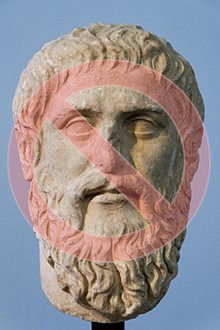“Nothing Is Desirable In and Of Itself Other Than Pleasure” – The Importance of the Argument Against Virtue As An End In Itself
Do you see why an Epicurean, in speaking about virtue, will never admit that a thing can be virtuous unless that thing is either pleasurable or leads to pleasure?
Do you realize why admitting that a thing can be virtuous without being pleasurable, or without leading to more pleasure or less pain, destroys the foundation of Epicurean Ethics?
Think about this: it is generally accepted in philosophical discussion that “the best life” or what some call “the highest good” should be the goal of life. No one wants to admit that they have set their sights on something less than the best. And being the best means that whatever we call the best cannot be improved upon.
Epicurus taught that the best life is a life of pleasure. That means that the measure of all things to choose and avoid is whether the choice leads to a more pleasurable life. It is also true that the most pleasurable life possible is going to be, by definition, a pleasurable life that is accompanied by as little pain as possible – in other words a life of pure pleasure with nothing to dilute it. But hold that thought while we stay with virtue – we’ll come back to “aponia” and “ataraxia” in just a moment.
Do you see what happens with those people who assert that “virtue” is good in and of itself? And that virtue should be chosen whether or not it leads to pleasure and avoids pain?
The conclusion is simple: If a good thing exists which is not either pleasure itself, or not a tool for obtaining pleasure and avoiding pain, then that means that there are OTHER good things BESIDES pleasure. And what is the significance of that?
Once we admit that there are other good things besides pleasure, then the conclusion is inescapable: the best possible life would be a life that combined pleasure PLUS these other good things that are not pleasure!
There are all sorts of ways the argument can go from here, but for the idea that the best life is one of pleasure, the argument can go nowhere but down.
If you are like Aristotle, you can try to hold on to pleasure as desirable, but you can say that other things are also desirable, so you end up having your best life be one of pleasure plus virtue. You can praise pleasure but also praise virtue – plus money and power and all sorts of other “good things” that are needed to secure it.
If you are like Plato or the Stoics, you can drop pleasure entirely, and say that pleasure is indifferent at best, or harmful at worst. You can then look for the best life solely in virtue, never answering the question as to why virtue might be desirable in itself.
But if you are like Epicurus you see the issue: ANYTHING which is held to be desirable, but which is not pleasurable itself, or a tool to achieve pleasure/avoid pain, dethrones Pleasure as the goal of life, because the newly defined goal is pleasure PLUS something else.
No matter what the term you use, whether its Virtue or any other word – including “ataraxia” or “aponia” or anything else – any other word which implies that it does not constitute pleasure itself, or a tool toward pleasurable living, becomes a knife to be used by adversaries of pleasure to separate people from the one faculty given them by Nature as the guide of life.
And so if you are like Epicurus you never for a minute admit that anything is “good” in and of itself other than pleasure.

